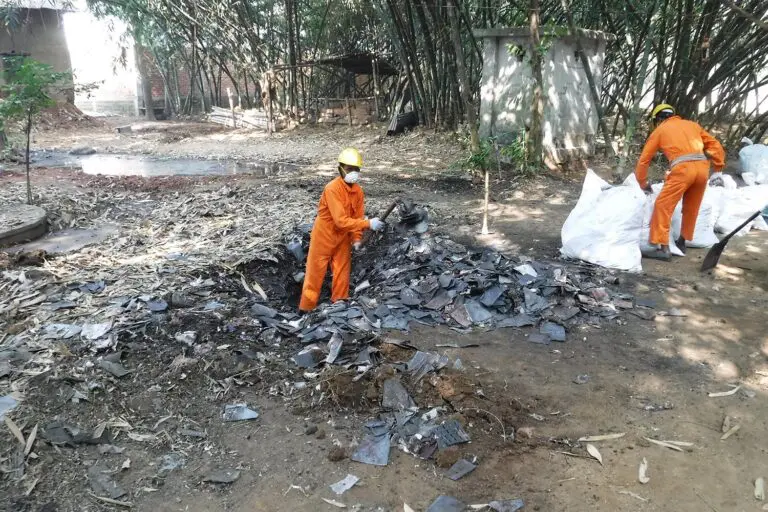Two Indiana-based hazardous waste treatment companies, Heritage Environmental Services LLC and Tradebe Treatment and Recycling LLC, have taken a central role in disposing of toxic firefighting foam stockpiles for the U.S. military. Their involvement has landed them in a contentious legal battle.
Both companies signed contracts to incinerate hundreds of thousands of gallons of aqueous film-forming foam (AFFF) containing PFAS chemicals. Environmental advocacy groups are challenging the contracts in court, arguing that incineration releases dangerous toxins into the air without ensuring complete destruction of PFAS chemicals.
“Incineration does not resolve the Department of Defense’s PFAS issues; it shifts the burden to communities already dealing with environmental risks,” said Jonathan Kalmuss-Katz, staff attorney for Earthjustice. The lawsuit highlights concerns about the health impacts of incineration, noting that PFAS chemicals were specifically designed to resist burning.
PFAS chemicals, first introduced in the 1940s, have been widely used for their ability to repel water and grease. In the 1960s, the U.S. Navy and 3M developed AFFF to combat aviation fuel fires. Although effective, PFAS chemicals have since been linked to health risks such as liver damage, pregnancy complications, low birth weight, and certain cancers. They also persist in the environment, contaminating soil and water long after use.
Several lawsuits have revealed that manufacturers, including 3M, were aware of PFAS’s toxicity for decades. The 2019 film Dark Waters brought this issue to broader public attention.
In 2016, the U.S. Environmental Protection Agency issued health advisories for two PFAS chemicals, PFOS and PFOA, in drinking water. That same year, the Department of Defense (DoD) implemented policies to phase out AFFF for maintenance, testing, and training purposes and began addressing PFAS contamination at military sites.
Indiana has several facilities where PFAS contamination has been detected, including the former Grissom Air Force Base, Jefferson Proving Ground, Hulman Field, and the Naval Surface Warfare Center in Crane. The contamination stems from AFFF use during firefighting training.
To manage existing stockpiles, the Defense Logistics Agency (DLA) contracted Heritage Environmental Services in 2016 and Tradebe Treatment and Recycling in 2018 to handle incineration in different regions of the U.S. Both companies are tasked with incinerating millions of gallons of PFAS-contaminated materials.
The incineration process requires facilities operating at temperatures exceeding 1,000 degrees Celsius to fully break down PFAS. However, there is limited data on air emissions resulting from this process. Advocacy groups argue that the lack of transparency about incineration sites and their impact on nearby communities raises serious concerns.
The Indiana Department of Environmental Management (IDEM) stated it is unaware of any facilities in the state incinerating AFFF. However, the DLA lists six Indiana facilities as qualified for hazardous waste disposal, including one owned by Heritage in Indianapolis and another owned by Tradebe in East Chicago.
Environmental groups are urging the military to explore safer disposal methods. Alonzo Spencer, president of Save Our County, expressed alarm over the potential risks of incineration. “Bringing yet another toxic chemical into our neighborhoods will have untold consequences without proper environmental review,” he said.
The DoD has committed to studying PFAS disposal further. The 2020 National Defense Authorization Act requires the agency to develop a policy for PFAS destruction, including monitoring air, water, and soil near disposal sites.
The lawsuit, filed by Earthjustice on behalf of advocacy groups, is set to be heard in the Northern District of California.
Related Posts:
- Banks, Chamber of Commerce Oppose Bill to Punish…
- Is Kratom Legal in Indiana? Current Laws and Regulations
- 10 Tips for Locating Legal Help in Small Indiana Town
- Granger, Indiana: Is This Suburb Still a Safe Haven…
- Indiana Car Accident Statistics 2025: Key Statistics…
- Indiana Lung Cancer Statistics 2025: Key Data and Trends










